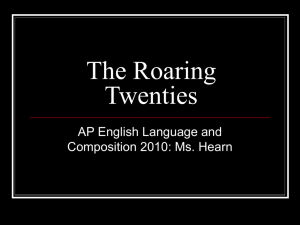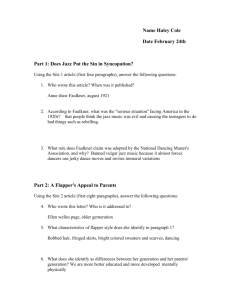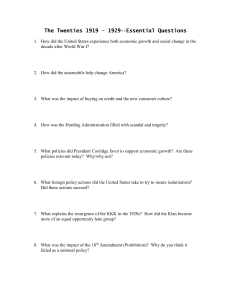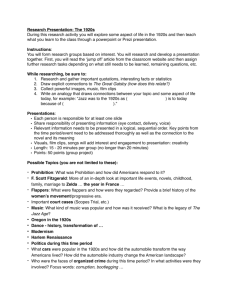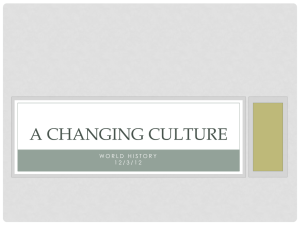The Roaring Twenties: Prosperity, Modernism, and Conflict The
advertisement
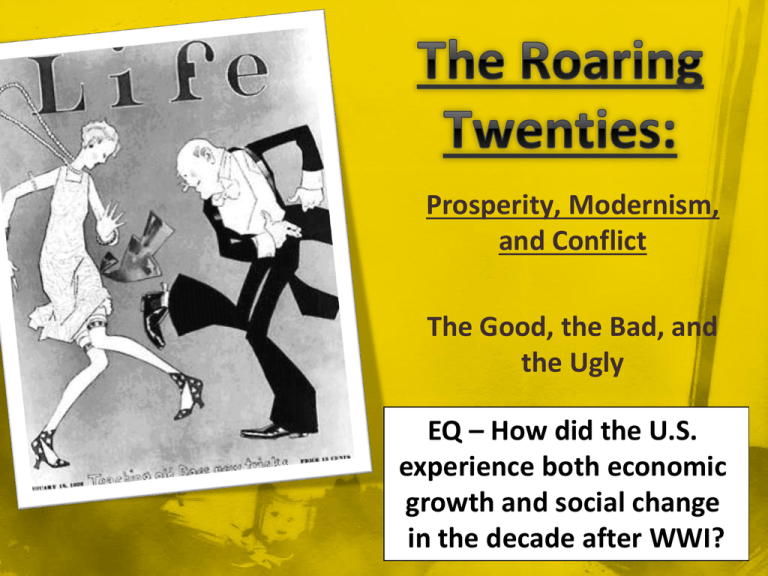
Prosperity, Modernism, and Conflict The Good, the Bad, and the Ugly EQ – How did the U.S. experience both economic growth and social change in the decade after WWI? http://www.learn360.com/ShowVideo.aspx?S earchText=jazz+age&lid=18565842&ID=64010 3&player=12 Play until 2:03 (strikes resumed) Warden Harding, elected in 1920, promises a return to “normalcy” What about Wilson’s idea of a US involved in world affairs? What about progressivism? The American people reject internationalism and progressivism By 1920, US is the richest and most industrialized country in the world A creditor nation – countries owe US more than US owes them European powers were weakened from war Overall, this is a period of great change and “modern America” is born 1920s was a Consumer revolution Affordable goods produced quickly What is the “driving” force behind this? Automobile Industry Henry Ford uses assembly lines to mass produce cars – the Model T (cost about $850) By 1927, it cost $290 In 1919, 10% of Americans had cars. By 1927, 56% had cars The Model T How did the Automobile Industry spur growth? What do cars require? Gas, steel, oil, glass, rubber Need streets/highways which means you need gas stations, diners, and hotels Henry Ford gives workers more pay, 8 hrs, weekends off – potential customers/leisure time With cars, people can live further away and drive to work – suburbs Installment Buying Not need cash. Simply put down payment and then pay monthly payments. Use credit. Stock market becomes a “Bull Market” Rising stock prices and Americans invest money to get rich quick How can average people buy stock? Buying on margin Buying stocks on credit Harding (1921-1923) & Coolidge (1923-1929) = Republicans “The business of America is business” Practice laissez-faire policy Reject progressivism, want to help business Reduce spending from 18 billion to 3 billion Lower taxes but raise tariffs The Harding Administration (1921-1923) What does Harding promise? Return to Normalcy Which means…? Less social reforms, return to “simpler times” How would you describe his economic policies? Pro-business; less regulations on businesses … Conservative policies! The Coolidge Administration (1923-1929) Nicknamed…? Silent Cal His economic policies were…? Pro-Business Also Conservative! “The chief business of the American people is business.” What is it? Stay out of world affairs and avoid another war Washington Naval Conference – limit size and construction of navy/warships Kellogg-Briand Pact – not use war to settle disputes US stays out of World Court *** Helps lead to WW2*** Focus Question: What do the youth of today have in common with the youth of the 1920s? Read Review the summary of the culture of the 1920s. Research Learn about the flappers of the 1920s. Respond Using the information from "A Flapper's Appeal to Parents," answer the questions concerning the flapper culture. Then compare the youth of today to the flappers of the 1920s. Process: You will work in groups to read/discuss You will have 10 minutes with each document to work and discuss with your group members Research: Answer the questions for the 3 documents and watch the video as a class http://www.youtube.com/watch?v=3svvCj4yhYc&feature=related&safe=active Synthesize: Using what you learned, complete the chart on Flappers and Modern Youth Using the documents provided, analyze the changes in American culture in the 1920s. More people live in urban areas Leisure time and more money Jazz, theaters, radio, phonograph, baseball Women take on social/political rights Enter workforce Go into politics “The Flapper” Flappers: Young women defying traditional rules of conduct & dress http://www.youtube.co m/watch?v=TRveIIe4uAs &feature=related Lucy does the jitterbug http://www.youtube.co m/watch?v=frLNbUWG5 24 Charles Lindbergh, The Spirit of St. Louis - Across Atlantic Babe Ruth Jack Dempsey Charlie Chaplin http://www.youtube.com/w atch?v=ewNLCkA0oBk&safe =active The Jazz Singer, http://www.youtube.com/watch?v=bkyvst NrkHo A New Culture: The Radio First Radio Station: KDKA Pittsburg The Phonograph Key figures: • Duke Ellington • Louis Armstrong • Bessie Smith http://www.youtube.com/watch?v=4wbNZFS3MDA The Lost Generation No more reliance on Victorian era Disillusioned by WWI Now they look for new truths/generation F. Scott Fitzgerald, The Great Gatsby Ernest Hemmingway, A Farewell to Arms Sinclair Lewis Gertrude Stein Blacks moving North/to cities during and after WWI Emergence of a black middle class Blacks “reinvent” their culture Black pride/nationalism Marcus Garvey and the “Back to Africa” movement Jazz – Cotton Club Other key figures: Claude McKay, Zora Neale Hurston, Langston Hughes Fear of communists within the country Why? What is communism? Russian Revolution – want International Revolution Want workers to rise up and overthrow capitalism What happens in US? Palmer Raids – attorney general/police arrest thousands of suspects Who? – immigrants from S. & E Europe ACLU – American Civil Liberties Union Arrests of Sacco and Vanzetti Italian immigrants Known anarchists Charged with killing two men What is the evidence? Witness said robbers looked Italian Nativism is on the rise Anti-immigration Emergency Quota Act and the National Origins Act Establish quota system for immigrants from specific countries Formula: # of immigrants from country could not exceed # of immigrants of nationality in 1890. Revived in 1915 Against changes in cities Target blacks, Jews, Catholics, immigrants, immorality Attracted 4-5 million Americans join because they are fearful of change Religious Americans see attack on Christianity with urban culture that is emerging Fundamentalists vs. Modernists in the Scopes Trial TN’s law against Darwin’s theory vs. ACLU/Scopes Creationism vs. Evolution Better technology - more food/less labor – lower prices – not make as much – banks call in loans - early depression for farmers Prohibition 18th Amendment passed…? Prohibition Which outlawed…? Use, sale, manufacture of alcohol Some people drank anyway, at illegal bars…? Speakeasies What amendment ENDED Prohibition? 21st Amendment Problem: 18th Amendment and Volstead Act “Drys” say it’s good because stop child abuse, not waste money, liver disease, moral “Wets” say will not stop people from drinking, lead to organized crime Both are right Which side are you on? Get illegal network of gangs/business Make or smuggle alcohol into the country Bootleggers – people who sold alcohol Speakeasies – secret drinking establishments Often spread to other area such as murder, robbery, drugs Most notorious – Al Capone http://video.pbs.org/video/2085881894 What president wanted to restore America to “normalcy”? What policies were implemented by the conservative governments? Describe what is meant by a “Bull Market” How did the US seek to stay out of world affairs? (two events/legislation) Who is Marcus Garvey and what did he want?
